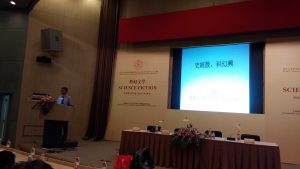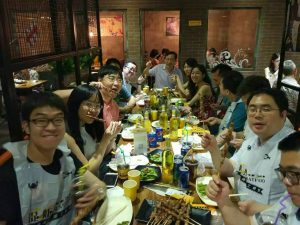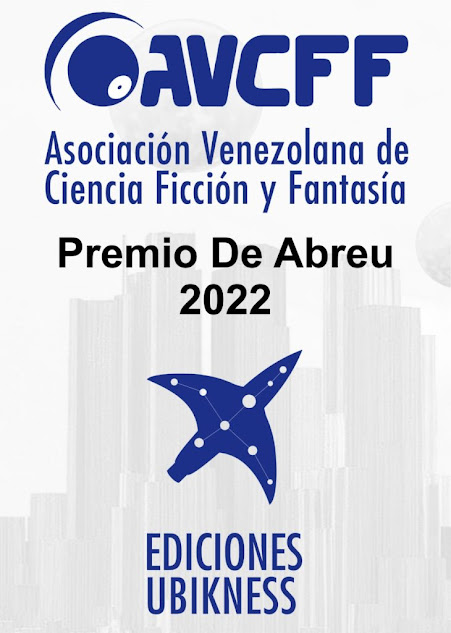On Jun 17-18, 2016, a workshop on science fiction was held at Fudan University, one of the most prestigious universities in China. It was the first time for Fudan to hold such a large-scale academic conference focusing on science fiction, where well-known scholars and writers gathered to share their insights on science fiction.
The workshop was held by the International Center for Studies of Chinese Civilization,Fudan University. Chen Sihe (陈思和) and Yan Feng (严锋) from Fudan University, together with Song Mingwei (宋明炜) from Wellesley College took up the organizational works of the conference. 20 papers were presented at the workshop by participants from both China and America. Writers from mainland China, Hong Kong and Taiwan were present during the workshop. Due to the expected popularity of the roundtable discussion session at the end of the workshop, the venue was moved to an auditorium that could hold up to 500 people and it was almost fully occupied during the session.
It was not the first time for Fudan to embrace science fiction. As early as in 2010, Han Song (韩松) and Fei Dao (飞氘), two of the Chinese science fiction writers whose works were considered possessing more literary flavors, were invited to a conference on “Literature in the First 10 Years of the New Century” held in Fudan. Both their works and the science fiction genre won attention from academics and critics alike.
Chen Sihe (陈思和), former Dean of the Chinese Literature Department and current Director of the Library of Fudan University, who had given a lecture on science fiction in Fudan last year, spoke at the workshop. Although not an expert in science fiction, he had gotten the chance to read and love early Taiwanese science fiction when he was young. He thought that science fiction would definitely have its position in the history of literature. In contrary to many fans’ opinions, Chen thought that Cheng Xin, the protagonist in Death’s End – the last book of The Three–Body Problem Trilogy, was an impressive figure because of her weakness. To him, the weakness represented the most powerful and precious aspect of humanity. The English readers will be able to read the book written by Liu Cixin and translated by Ken Liu in September this year. You can make your own judgement by then.
 David Der-wei Wang (王德威), Edward C. Henderson Professor of Chinese Literature from Harvard University, performed as the key-note speaker. David is a Taiwanese-born American scholar, quite a big name in the field of Comparative Literature and Eastern-Asian Studies. His topic was “The Collapse of History Tradition, the Rise of Science Fiction”.
David Der-wei Wang (王德威), Edward C. Henderson Professor of Chinese Literature from Harvard University, performed as the key-note speaker. David is a Taiwanese-born American scholar, quite a big name in the field of Comparative Literature and Eastern-Asian Studies. His topic was “The Collapse of History Tradition, the Rise of Science Fiction”.
He looked back at the history of science fiction in China from two perspectives: 1) fantasy and imagination/realism writing; 2) utopia/dystopia/heterotopia. As you may know, it is generally agreed that modern science fiction was introduced into China in the Late Qing Dynasty. David thought that the imagination in the Late Qing Dynasty science fiction was flooded by the realism in the May 4th New Cultural Movement. However, it was too arbitrary to put imagination in the opposite position of realism. He also named a few examples of the utopia/dystopia/heterotopia society in early Chinese science fiction works.
David summarized three viewpoints in regard to science fiction: 1) historical/political allegory; 2) dialogues between affect and episteme; 3) post-human intervention/intention. Examples from both Hong Kong, Taiwan and Mainland China writers were provided.
In the end, David put forward his observation. Since the New Cultural Movement, “crisis consciousness” has been considered the focus of writing. However, compared to “crisis consciousness”, “dark consciousness” is the best gift from the contemporary science fiction writers, which leads us into a wider world. Science fiction can teach people a brand new way of seeing the world, to unveil those invisible things.
To everyone’s surprise, Luo Yijun (骆以军), the famous Taiwanese writer, was also present. He was invited to the podium and revealed that his entire family including himself were great fans of the Three-Body Problem Trilogy.
 The 20 papers for presentation were divided into 5 groups, some written in Chinese, others in English. Some of the American scholars wrote the papers in English but presented them in Chinese. The topics were very diverse, ranging from literature to film, from the Late Qing Dynasty to contemporary. I also presented a paper on “Speculative Fiction Writing by Ken Liu – Centre of Multi-Marginalities”. To my surprise, the paper arouse the interest from Wenyi Bao(The Art and Literature Gazette), a newspaper belonging to China Writers’ Association and founded in 1949. Later on my paper was published in Wenyi Bao.
The 20 papers for presentation were divided into 5 groups, some written in Chinese, others in English. Some of the American scholars wrote the papers in English but presented them in Chinese. The topics were very diverse, ranging from literature to film, from the Late Qing Dynasty to contemporary. I also presented a paper on “Speculative Fiction Writing by Ken Liu – Centre of Multi-Marginalities”. To my surprise, the paper arouse the interest from Wenyi Bao(The Art and Literature Gazette), a newspaper belonging to China Writers’ Association and founded in 1949. Later on my paper was published in Wenyi Bao.
 The climax of the 1.5-day workshop was the roundtable discussion, in which many of the science fiction writers attended. It was chaired by Song Mingwei. Chan Koonchung (陈冠中), the Hong Kong writer who is regarded as a science fiction writer because of his novel, The Fat Years, was the first to speak. Han Song (韩松), Liu Cixin(刘慈欣) and Wang Jinkang (王晋康), the “Big Three” of Chinese science fiction discussed their concern on science fiction and the different charms of literature and movies. Yao Haijun (姚海军), editor-in-chief of Science Fiction World, often referred to as China’s John W. Campbell, shared the history of mutual influence between the magazine and Chinese science fiction. Chen Qiufan(陈楸帆), Fei Dao(飞氘), Xia Jia(夏笳), Zhao Haihong(赵海虹), Bao Shu(宝树) and Jiang Bo(江波), the younger writers, all shared their thoughts, about the future of science fiction, the relationship between science fiction and reality, the marginality of science fiction and identity, the new poetics of science fiction, the curiosity to the unknown, etc..
The climax of the 1.5-day workshop was the roundtable discussion, in which many of the science fiction writers attended. It was chaired by Song Mingwei. Chan Koonchung (陈冠中), the Hong Kong writer who is regarded as a science fiction writer because of his novel, The Fat Years, was the first to speak. Han Song (韩松), Liu Cixin(刘慈欣) and Wang Jinkang (王晋康), the “Big Three” of Chinese science fiction discussed their concern on science fiction and the different charms of literature and movies. Yao Haijun (姚海军), editor-in-chief of Science Fiction World, often referred to as China’s John W. Campbell, shared the history of mutual influence between the magazine and Chinese science fiction. Chen Qiufan(陈楸帆), Fei Dao(飞氘), Xia Jia(夏笳), Zhao Haihong(赵海虹), Bao Shu(宝树) and Jiang Bo(江波), the younger writers, all shared their thoughts, about the future of science fiction, the relationship between science fiction and reality, the marginality of science fiction and identity, the new poetics of science fiction, the curiosity to the unknown, etc..
It was quite an informative workshop, but the most fun part was of course the late night happy hours. Since it was the crayfish season in Shanghai, the science fiction writers and researchers turned from BBQ to crayfish hunting. I can’t say how many kilos of crayfish they ate and how many bottles of beers they drank. I only know that even they stayed up till 1 or 2 in the night, they were still able to get up early in the morning. In this sense, science fiction is a “young” genre.

[Photo credit: Xiao Han]
Appendix: Papers presented at the “Science Fiction” workshop
Group A: Forms and Modernities
Moderator: Zhang Xinying张新颖 (Fudan University)
Wu Yan吴岩 (Beijing Normal University): The Basic Patterns of Science Fiction Creativity 对科幻创意基本模式的探讨
Han Song韩松 (Xinhua News Agency): Little Smart Roaming the Future and the Modernity of China《小灵通漫游未来》与中国的现代性
Seo-Young Chu (Queens College, CUNY): Ex-DPRK Hallyu
Carlos Rojas (Duke University): The Exploration of Future in Histories of Time: The Luster of Mute Porcelain by Dung Kai-Cheung 董啟章的《时间繁史》中对未来的探索
Group B: Historical Perspectives
Moderator: Yang Yang杨扬 (East China Normal University)
Jia Liyuan (Fei Dao) 贾立元: (Beijing Normal University) The Colonial Narration in Late Qing Dynasty Science Fiction – A Case of Lunar Colony晚清科幻小说中的殖民叙事——以《月球殖民地小说》为例
Ren Dongmei任冬梅 (Chinese Academy of Social Science): On “Interplanetary China” in ROC Science Fiction论民国科幻小说中的“星际中国”
Chen Jingling陈婧祾(Middlebury College):A “True Story” of SF: Lucian and His Chinese Episode
Cara Healey (University of California, Santa Barbara): Madman and Iron Houses: Rethinking Lu Xun’s Role in Contemporary Chinese Science Fiction
Group C: New Horizons
Moderator: Song Binghui宋炳辉 (Shanghai International Studies University)
Nathaniel Isaacson (North Carolina State University): The Outsourcing of Affect
Li Guangyi李广益 (Chongqing University): The Decision of Luo Ji: The Existentialism in The Three–Body Problem Trilogy and Its Cultural Revelation罗辑的决断:《三体》的存在主义意蕴及其文化启示
Regina Kanyu Wang王侃瑜 (Fudan University): Speculative Fiction Writing by Ken Liu – Centre of Multi-Marginalities刘宇昆的推测性文学书写——多重边缘下的中心
Jiang Zhenyu姜振宇 (Beijing Normal University): The Ecological Status of Science Fiction Literature in the Internet Age网络时代科幻小说的生存状况
Group D: Anglo-American Voices
Moderator: Wang Hongtu王宏图 (Fudan University)
Dai Congrong戴从容 (Fudan University): The Literature Classiness in Science Fiction – A Case Study of the Hyperion series科幻文学的文学经典性——以“海伯里安系列”为例
Zheng Jingyi郑静怡 (Fudan University): Cyborgs in Arthur C. Clarke’s Science Fiction Stories论阿瑟克拉克科幻小说中的赛博格
Zhan Ling詹玲 (Hangzhou Normal University): Utilitarianism, Justice and Humanistic Spirit: Discussion on Life Values in Science Fiction –In Response to the Dispute Aroused by The Cold Equations功利,正义与人文精神:科幻小说中的生命价值观探讨——从《冷酷的方程式》引发的争议说起
Zhao Ruhan赵如汉(Brockport College, SUNY): Science Fiction Organizations and Activities in the USA美国科幻组织以及科幻相关活动初探
Group E: Unknown/Uncanny
Moderator: Gao Yuanbao郜元宝 (Fudan University)
Chen Qiufan陈楸帆 (Writer): Virtual Reality in Science Fiction科幻小说中的虚拟现实
Wang Yao (Xia Jia) 王瑶 (Xi’an Jiaotong University): “A Brave New World” or “One World”? – The Digital Revolution in Contemporary Chinese Science Fiction“美丽新世界”还是“大同世界”?——当代中国科幻小说中的数码革命
Liu Zhirong刘志荣 (Fudan University): AI and Ourselves AI与我们自己
Song Mingwei宋明炜(Wellesley College): Reproduction of the Invisible: Poetic Question of the Chinese Science Fiction New Wave再现不可见之物:中国科幻新浪潮的诗学问题
Editor’s Note: the Qing Dynasty ruled from 1644 until 1912, a time frame that encompasses much of the history of “proto” science fiction and the early 20th century when authors such as Burroughs, Wells, Leinster and others were publishing in magazines like Munseys. Lin Zexu translated Shakespeare during the Qing Dynasty.










Recent Comments